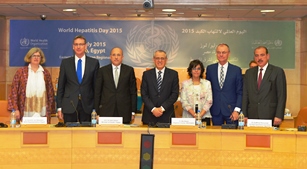 Dr Lisa Hedman, WHO headquarters; Dr Henk Bekedam, WHO Representative in Egypt; Dr Adel Adawi, H.E. the Minister of Health of Egypt; Dr Ala Alwan, WHO Regional Director for the Eastern Mediterranean; Dr Manal El Sayed, Ministry of Health; Dr Gottfried Hirnschall, Director of the HIV Department, WHO headquarters; and Dr Amr Kandeel, Ministry of Health28 July 2015 – The WHO Regional Office for the Eastern Mediterranean held an event to observe World Hepatitis Day in Cairo to shed light on the magnitude of viral hepatitis as a global public health threat.
Dr Lisa Hedman, WHO headquarters; Dr Henk Bekedam, WHO Representative in Egypt; Dr Adel Adawi, H.E. the Minister of Health of Egypt; Dr Ala Alwan, WHO Regional Director for the Eastern Mediterranean; Dr Manal El Sayed, Ministry of Health; Dr Gottfried Hirnschall, Director of the HIV Department, WHO headquarters; and Dr Amr Kandeel, Ministry of Health28 July 2015 – The WHO Regional Office for the Eastern Mediterranean held an event to observe World Hepatitis Day in Cairo to shed light on the magnitude of viral hepatitis as a global public health threat.
The resounding call this year is for all parties to work together to prevent the transmission of hepatitis B and C. WHO is increasing people’s awareness of the risks of contracting hepatitis from unsafe blood, unsafe injections and sharing drug-injecting equipment and is telling the public to demand safe injections, get vaccinated and tested and seek treatment.
The event is being hosted by the WHO Regional Director Dr Ala Alwan and the Minister of Health of Egypt H.E. Dr Adel Adawi. Dr Gottfried Hirnschall, Director of the HIV Department, WHO headquarters, and Mr Charles Gore, President of World Hepatitis Alliance, will attend, in addition to a broad array of representatives from nongovernmental organizations, the media and academia, and health sector partners.
Egypt has been chosen to hold the event as the country has a high burden of viral hepatitis C (prevalence 7% in adults), and high-level commitment has been demonstrated by the political leadership in the country to treat all people infected. “I am very proud and happy today to commend Egypt on the progress made in their national hepatitis C treatment programme,” says Dr Margaret Chan, WHO Director-General. “Egypt is giving us an example of the achievements that can be made when political commitment, resources and results-oriented planning come together.”
Viral hepatitis is one of the most prevalent and serious diseases worldwide and yet many people, including health policy-makers, remain unaware of its staggering toll on global health. The Eastern Mediterranean Region is among the most affected by hepatitis in the world. Every year, around 4.3 million people are infected with hepatitis B virus and 800 000 people with hepatitis C virus. Around 17 million people currently suffer from chronic hepatitis C.
“Unfortunately, many people in our Region still acquire the infection in health care settings, through unsafe injections and unscreened blood transfusions,” said Dr Alwan. To address the problem WHO and the Ministry of Health of Egypt are launching a national injection safety project to reinforce infection control measures and transition to the exclusive use of safety syringes. The project falls within the context of the WHO Global Initiative for Injection Safety, in which Egypt was chosen to participate as one of 3 pilot countries, with India and Uganda. The project will foster new training approaches for health care workers to achieve changes in practice and develop measures to educate and engage the community in the promotion of safe injection practices.
“Together, we will stand up to the challenge to ensure that health care is safe and that people are informed about infection, transmission and prevention. We will work to ensure that newborn infants and adults at risk are vaccinated against hepatitis B.
The WHO Regional Office is in process of developing a regional framework and will support countries to develop national multisectoral plans,” said Dr Alwan.
Related links
World Hepatitis Day in Egypt focuses on hepatitis B and C prevention
Note for the editor
Globally:
- 240 million people with chronic hepatitis B infection
- Approximately 780 000 die each year from hepatitis B
- 130–150 million people with chronic hepatitis C infection
- Approximately 500 000 die each year from hepatitis C
- 1.4 million persons die each year from all forms of hepatitis (A–E)


